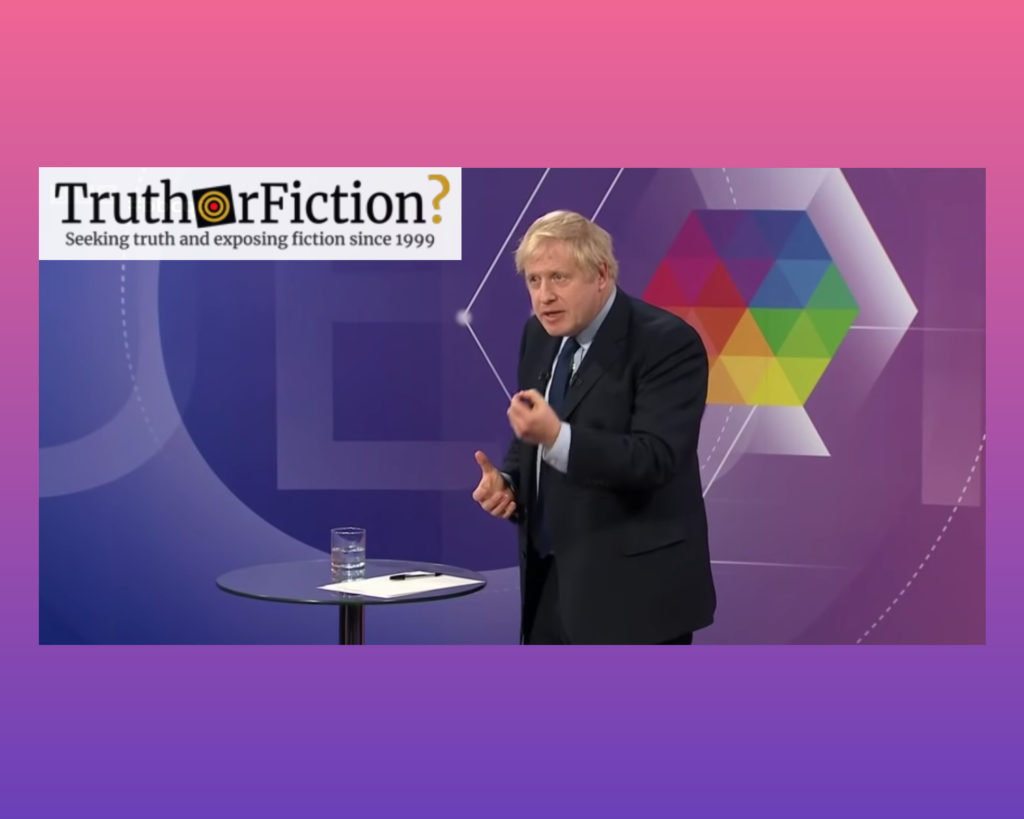The British Broadcasting Corporation faced accusations of political bias in November 2019 after social media users spotted the difference between a television audience’s live reaction to a question directed at UK Prime Minister Boris Johnson and the way it was presented on a network news show the following day.
Johnson was taking part in an election forum hosted by the BBC program Question Time on November 22 2019 when one audience member asked, “How important is it for someone in your position of power to always tell the truth?”
The live footage indicated that the audience began laughing before Johnson could respond. But as a supporter of Labour Party candidate Jeremy Corbyn showed on Twitter, the laughter was cut out from a network clip of that exchange that aired on BBC News the following day.
In that version, Johnson begins his response amid the sound of applause:
I’m wary of attacking the BBC but this is utterly insane.@BBCNews has edited out the audience laughing at Boris Johnson when questioned on trust.
The first part is the actual footage, the second is from BBC News at 1pm today… pic.twitter.com/lQAE1Y3M6A
— Hasan Patel ???? (@CorbynistaTeen) November 23, 2019
The tweet was shared thousands of times, and it led to more Twitter users both questioning the BBC and posting the original footage, accusing them of skewing their reporting to cover up for the prime minister.
Rob Burley, who produces the BBC’s live political programming slate, responded to the questioning on Twitter.
“Those suggesting the BBC is trying to suppress the Prime Minister’s encounter with the public on Friday night ignore the fact that the entire thing was broadcast in evening prime time by, er, the BBC!” he wrote.
The company posted a separate response to the criticism on its own Twitter account.
“This clip, which was played in full on the 10 o’clock news last night, was shortened for timing reasons in today’s lunchtime bulletin,” the BBC said. “We’ve fully covered Boris Johnson’s appearance on the BBC QT special, and the reaction to it, across our outlets.”
It is common for broadcast networks to edit video and audio clips to account for time constraints, as BBC described. However, the accusations surrounding Johnson’s Question Time appearance follow another pair of incidents calling into question the network’s reporting, adding fuel to this particular rumor.
Earlier in November 2019, Peter Oborne — a conservative-leaning former supporter of the Brexit movement, which is pushing to cleave the United Kingdom from the European Union — said in an op-ed for The Guardian that he felt BBC was shirking its responsibilities.
“I have talked to senior BBC executives, and they tell me they personally think it’s wrong to expose lies told by a British prime minister because it undermines trust in British politics,” he wrote. “Is that a reason for giving Johnson free rein to make any false claim he wants?”
Burley denied the accusation.
“I run BBC political programmes and I have never, ever heard anyone here or anywhere else say such a thing,” he wrote on Twitter. “Just because it’s in a newspaper and then shared on social media does not make it true.”
However, BBC did apologize after a November 10 2019 broadcast included failed to mention that it used footage of Johnson taken from a Remembrance Day event three years earlier.
“That begs the question, why was the production team looking into archive rather than the footage released yesterday?” one viewer asked online. “Was it a damage limitation expertise? Shame on you BBC, I have always defended you, loved you, am so disappointed.”

